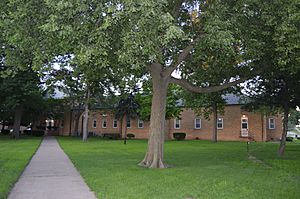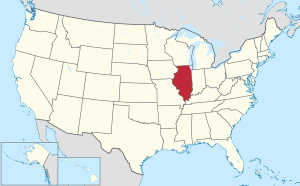Mason County, Illinois facts for kids
Quick facts for kids
Mason County
|
|
|---|---|

Mason County Courthouse, Havana
|
|

Location within the U.S. state of Illinois
|
|
 Illinois's location within the U.S. |
|
| Country | |
| State | |
| Founded | 1841 |
| Named for | George Mason |
| Seat | Havana |
| Largest city | Havana |
| Area | |
| • Total | 563 sq mi (1,460 km2) |
| • Land | 539 sq mi (1,400 km2) |
| • Water | 24 sq mi (60 km2) 4.3% |
| Population
(2020)
|
|
| • Total | 13,086 |
| • Estimate
(2021)
|
12,881 |
| • Density | 23.243/sq mi (8.974/km2) |
| Time zone | UTC−6 (Central) |
| • Summer (DST) | UTC−5 (CDT) |
| Congressional district | 15th |
Mason County is a county in the U.S. state of Illinois. According to the 2020 census, it had a population of 13,086. Its county seat is Havana. The county is named in honor of George Mason, a member of the Virginia legislature who campaigned for the adoption of the United States Bill of Rights.
Contents
History
Mason County was created in 1841 out of portions of Tazewell and Menard counties.
Geography
According to the U.S. Census Bureau, the county has an area of 563 square miles (1,460 km2), of which 539 square miles (1,400 km2) is land and 24 square miles (62 km2) (4.3%) is water.
Mason County is bound on the south by the Sangamon River, and on the west by the Illinois River. These rivers join at the county's southwest tip.
The soil covering much of Mason County is very sandy. This was formed during the melting of the Wisconsin Glacier about 10,000 years ago. Meltwater from the glacier deposited large amounts of sand in a delta region near at the junction of the Sangamon and Illinois Rivers.
The sandy soil does not hold water well, quickly exposing crops to drought conditions as the water table drops during periods of low precipitation. However, the soil is very good for growing vegetables that are otherwise not common in Illinois. Modern irrigation has made this a highly productive agricultural area.
A sand wetland on the Illinois River is managed by the U.S. Fish and Wildlife Service as the Chautauqua National Wildlife Refuge.
National protected area
State Forest
- Sand Ridge State Forest - Containing 7,200 acres (2,900 ha), it is the largest state forest in Illinois.
State Fish & Wildlife Areas
- Sanganois State Fish & Wildlife Area (part)
Climate and weather
| Weather chart for Havana, Illinois | |||||||||||||||||||||||||||||||||||||||||||||||
|---|---|---|---|---|---|---|---|---|---|---|---|---|---|---|---|---|---|---|---|---|---|---|---|---|---|---|---|---|---|---|---|---|---|---|---|---|---|---|---|---|---|---|---|---|---|---|---|
| J | F | M | A | M | J | J | A | S | O | N | D | ||||||||||||||||||||||||||||||||||||
|
1.9
32
14
|
1.9
38
19
|
3
50
30
|
3.5
63
40
|
4.4
74
51
|
3.8
84
60
|
3.9
88
64
|
3.5
86
61
|
3.2
80
52
|
2.9
68
41
|
3.3
51
30
|
2.6
37
19
|
||||||||||||||||||||||||||||||||||||
| temperatures in °F precipitation totals in inches source: The Weather Channel |
|||||||||||||||||||||||||||||||||||||||||||||||
|
Metric conversion
|
|||||||||||||||||||||||||||||||||||||||||||||||
In recent years, average temperatures in the county seat of Havana have ranged from a low of 14 °F (−10 °C) in January to a high of 88 °F (31 °C) in July, although a record low of −30 °F (−34 °C) was recorded in January 1999 and a record high of 106 °F (41 °C) was recorded in July 1983. Average monthly precipitation ranged from 1.85 inches (47 mm) in January to 4.43 inches (113 mm) in May.
Adjacent counties
- Fulton County - northwest
- Tazewell County - northeast
- Logan County - southeast
- Menard County - south
- Cass County - southwest
- Schuyler County - west
Transportation
Public Transportation
- SHOW Bus
Major highways
 U.S. Highway 136
U.S. Highway 136 Illinois Route 10
Illinois Route 10 Illinois Route 29
Illinois Route 29 Illinois Route 78
Illinois Route 78 Illinois Route 97
Illinois Route 97 Illinois Route 100
Illinois Route 100
Demographics
| Historical population | |||
|---|---|---|---|
| Census | Pop. | %± | |
| 1850 | 5,921 | — | |
| 1860 | 10,931 | 84.6% | |
| 1870 | 16,184 | 48.1% | |
| 1880 | 16,242 | 0.4% | |
| 1890 | 16,067 | −1.1% | |
| 1900 | 17,491 | 8.9% | |
| 1910 | 17,377 | −0.7% | |
| 1920 | 16,634 | −4.3% | |
| 1930 | 15,115 | −9.1% | |
| 1940 | 15,358 | 1.6% | |
| 1950 | 15,326 | −0.2% | |
| 1960 | 15,193 | −0.9% | |
| 1970 | 16,161 | 6.4% | |
| 1980 | 19,492 | 20.6% | |
| 1990 | 16,269 | −16.5% | |
| 2000 | 16,038 | −1.4% | |
| 2010 | 14,666 | −8.6% | |
| 2020 | 13,086 | −10.8% | |
| 2023 (est.) | 12,523 | −14.6% | |
| U.S. Decennial Census 1790-1960 1900-1990 1990-2000 2010-2013 |
|||
As of the 2010 United States census, there were 14,666 people, 6,079 households, and 4,060 families living in the county. The population density was 27.2 inhabitants per square mile (10.5/km2). There were 7,077 housing units at an average density of 13.1 per square mile (5.1/km2). The racial makeup of the county was 98.1% white, 0.4% black or African American, 0.3% Asian, 0.2% American Indian, 0.1% from other races, and 0.9% from two or more races. Those of Hispanic or Latino origin made up 0.8% of the population. In terms of ancestry, 33.8% were German, 15.6% were American, 11.1% were English, and 10.3% were Irish.
Of the 6,079 households, 28.9% had children under the age of 18 living with them, 52.1% were married couples living together, 10.3% had a female householder with no husband present, 33.2% were non-families, and 28.4% of all households were made up of individuals. The average household size was 2.38 and the average family size was 2.87. The median age was 44.0 years.
The median income for a household in the county was $42,461 and the median income for a family was $51,348. Males had a median income of $43,448 versus $31,087 for females. The per capita income for the county was $23,427. About 13.8% of families and 15.2% of the population were below the poverty line, including 23.6% of those under age 18 and 7.5% of those age 65 or over.
Mason County was identified as a “sundown” county which “has remained all white for many decades, despite its location between Springfield and Peoria...”.
Communities
Cities
- Havana (seat)
- Mason City
Villages
Census-designated place
Other unincorporated communities
Townships
- Allens Grove
- Bath
- Crane Creek
- Forest City
- Havana
- Kilbourne
- Lynchburg
- Manito
- Mason City
- Pennsylvania
- Quiver
- Salt Creek
- Sherman
Education
K-12 school districts include:
- Havana Community Unit School District 126
- Illini Central Community Unit School District 189
- Midwest Central Community Unit School District 191
It also includes portions of an elementary school district, New Holland-Middletown Elementary School District 88, and a secondary school district, Lincoln Community High School District 404.
See also
 In Spanish: Condado de Mason (Illinois) para niños
In Spanish: Condado de Mason (Illinois) para niños


